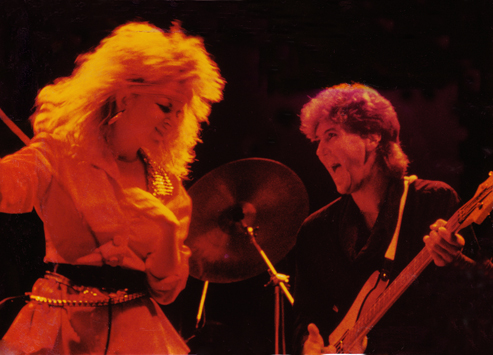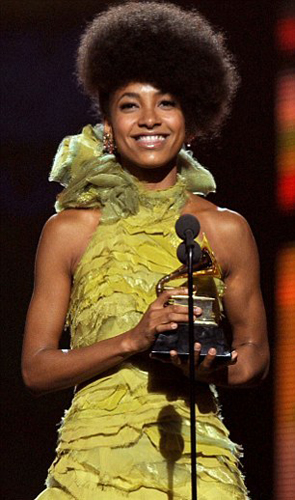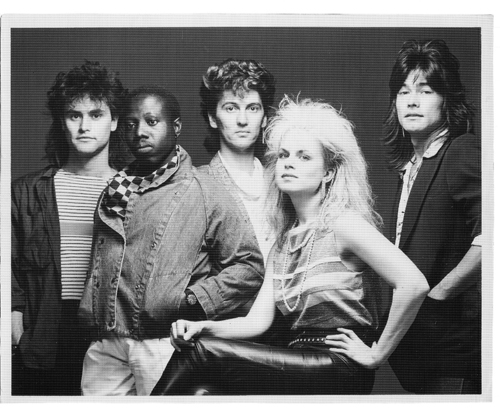I love music.

I've loved it since I first put a needle on a 45 (yep, that old). It soundtracked my life, reflected my heartaches, and serenaded my romances. I've lived music as a longtime singer/songwriter and I remain admirably contemporary in my musical tastes (i.e., I knew who Arcade Fire and Muse were). So when I watch the Grammy Awards I do so as a fan, a cheerleader, a participant and, yes, a critic.
There was obviously an abundance of extraordinary talent on stage. These are, after all, the folks being awarded for excellence, they should be talented! And while there are those select few who perform with elegant simplicity, it seems more likely that to be truly relevant in today's music industry, one is compelled to put on a production worthy of Franco Dragone. Act after act exploded onstage with cadres of limb-snapping dancers, robotic vocorder vocals, lights and smoke and mirrors and enough gymnastics to exhaust Cathy Rigby. As I blinked frantically enough to ward off seizures, I couldn't help but wonder why cacophony has so thoroughly bewitched the art of music.
I absolutely enjoy snappy choreography, spectacle is fun, and vibrant stage presence is a must, but nowadays you not only have to possess a model's body, Alvin Ailey's dance moves, a fierce stage entourage and plenty of digital enhancements, it doesn't appear you need to be all that good at the actual singing part. Or at least it's getting harder and harder to figure out if you are.
Allow me this incongruous analogy:
The recent Taco Bell "where's the beef?" brouhaha struck a chord. Look, if you tell me I'm getting a beef taco with sand product and oatmeal dust and I still want to buy that taco and inexplicably find it palatable, you've done your job as an honest promoter and I'm a consumer with no taste. Likewise, if a listening, cheering, music-purchasing fan knows the artist they're cheering has had each note auto-tuned to perfection, every strum mimicked by an actual player and those original songs ghostwritten by a pro and they still love that artist, well, OK...they're buying into the illusion (delusion?) and no harm done. They don't mind the sand and oatmeal.
But what about those of us who want the real thing? Who want to know that what we're hearing and cheering is true singing talent, perfected over years of experience or nurtured from innate ability? That a songwriter we admire has honestly created his catalogue, artfully rendered from hours in the bubble with his creative muse?

When Esperanza Spalding staged her upset much to the chagrin of Bieber handlers and screaming Wikipedia-hacking pre-teens everywhere, it was a rare moment of victory for authenticity. I don't begrudge young Justin his success; every era has its boy-toy singers and he's on delightful par with Bobby Sherman, Davey Jones, David Cassidy, even Simon LeBon. He has his talent, for certain, but put him on a stool with an acoustic guitar and no trickery and all too quickly we see behind the curtain. Saturday Night Live has unwittingly served to "out" the ranks of dubious stars who lack authentic singing skills, from Nelly Furtado, Britney Spears, Taylor Swift, even nominated Florence and the Machine. And yet, strangely, even when it becomes clear just how limited these singers are, fans don't seem to care. Sand and oatmeal.
When I came up in the music business, being able to hit your notes with heart and tone was a matter of pride to every singer I knew. Our analogue engineers had to arduously punch in words or syllables that needed pitch correction and that could take some serious billable time. Sometimes we were obligated to re-record entire sections of a song for that one bad note. We worked our chops in the process and being pitch perfect got you both work and respect.

Then came Pro Tools and the birth of the digital star. When I last recorded in a digital studio in Burbank, CA., the engineer working with my group was also engineering the sessions of a young (to remain nameless) Disney star who was selling records by the millions and, as it turns out, couldn't sing a lick. Our engineer reported that he was required to auto-tune, "I'm not exaggerating, every single note" and spent even more time trying to get her tone somewhere near human aural tolerance. She was a huge singing star nonetheless and that record? Yep, sold millions. Sand and oatmeal.
Digital manipulation is here to stay and like any other technological advance, it can be used for both good and evil. It allowed me and many other independent artists to make our records and it has literally revolutionized the recording industry. It has also served to manufacture into existence marginally talented artists whose polished perfection is a sham. And a shame. Sold to a gullible public who don't know the difference or don't care.
Yet even in the midst of all this artistic chicanery, the true artists emerge. And every once in awhile someone like Esperanza Spalding pierces the curtain and shows them all how it's done. And we are delighted by her authentic and mesmerizing talent. Not a speck of sand or oatmeal in sight.
